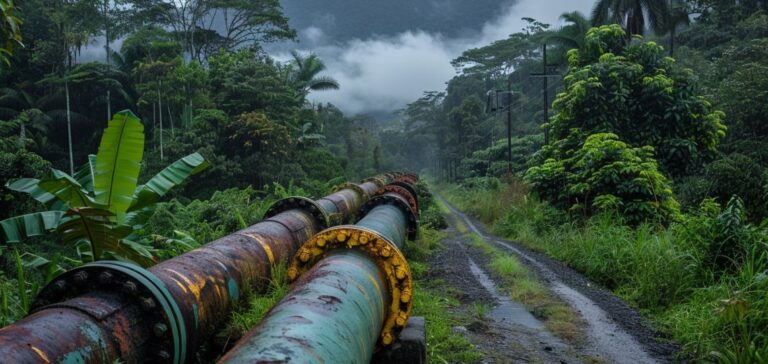Petroecuador, the Ecuadorian state-owned oil company, declared an emergency on Tuesday regarding its main pipeline after a significant crude oil spill occurred on March 13. The spill, caused by a landslide, released an estimated 200,000 barrels of oil into several rivers, including the Esmeraldas River, and onto the country’s Pacific coast. As a result, the company suspended its exports of Oriente crude oil, one of the two types of crude produced by Ecuador, invoking force majeure to avoid potential contractual penalties.
Environmental and human impact
The pollution caused by this spill has severely affected the drinking water supply for thousands of people living in the northwest of the country. According to local authorities, nearly 500,000 people have been impacted by the contamination. Rivers, notably the Caple and Viche rivers, are now unusable for the inhabitants, with both rivers contaminated by a mixture of oil and water. The situation is particularly concerning as this region heavily depends on the water from these rivers for domestic consumption and economic activities, particularly fishing.
Impact on local biodiversity
The incident has also had severe consequences for local biodiversity. Authorities declared an environmental emergency in the province of Esmeraldas, especially in a protected area that is home to diverse wildlife, including endangered species such as otters and howler monkeys. Marine biologist Eduardo Rebolledo stated that the contamination of the rivers has wiped out all aquatic life, a worrying situation for local ecosystems. Authorities have also warned of the degradation of fishing conditions, essential for the livelihoods of thousands of local families.
Measures taken by Petroecuador
In response to this crisis, Petroecuador has activated an intervention plan to stop the spill and recover the released oil. Tanker trucks have been deployed to the Quinindé region to collect the oil, while three ships carrying drinking water are expected to be sent to the port of Esmeraldas to meet the water needs of the affected populations. The company clarified that the emergency is expected to last no more than 60 days, allowing the necessary resources to be allocated to limit the impact on the exploration, exploitation, and commercialization of hydrocarbons.
Economic consequences for the oil sector
This spill comes at a time when Ecuador produces approximately 475,000 barrels of oil per day, making oil one of its primary sources of revenue. In 2024, the Ecuadorian oil sector generated nearly $8.6 billion. If the situation persists, oil export revenues could be affected in the short term, threatening the local economy and the stability of public finances.





















